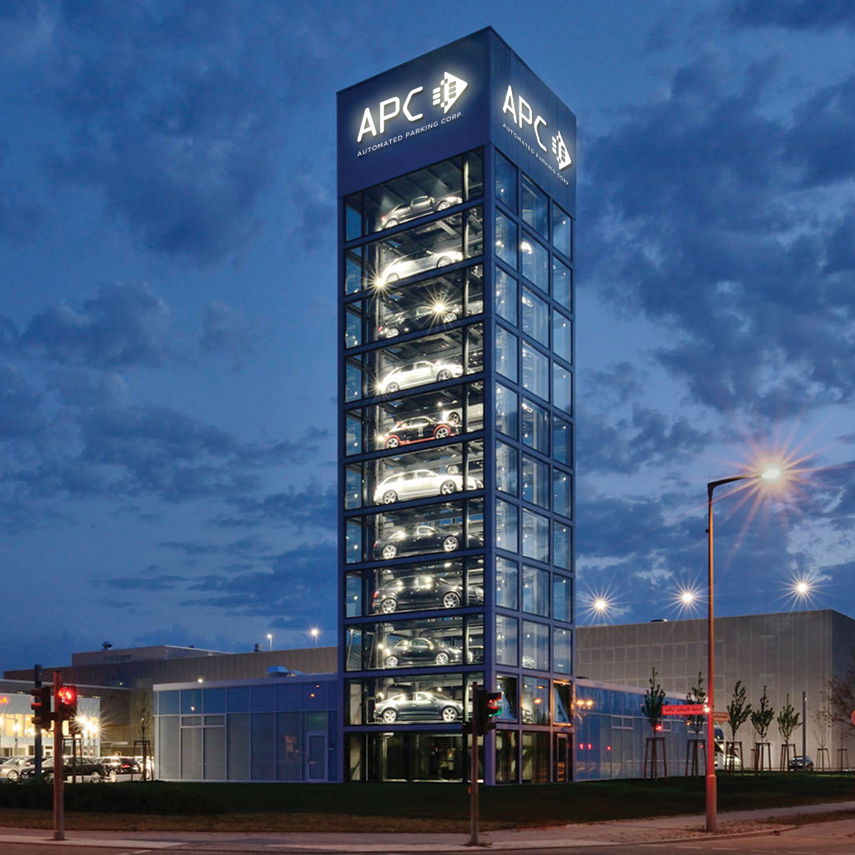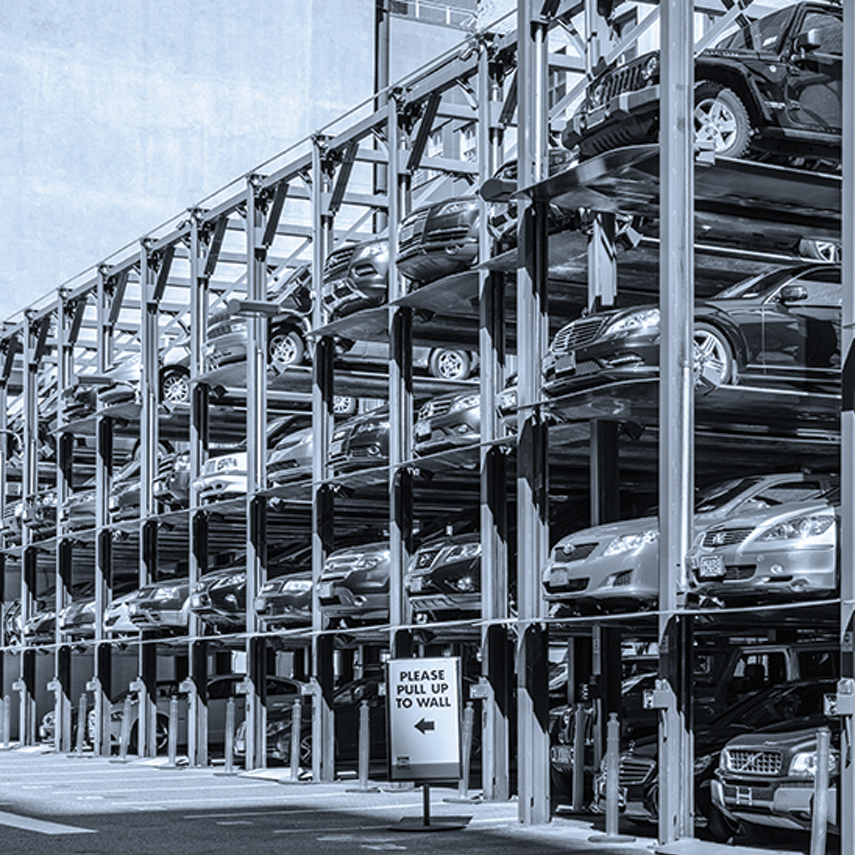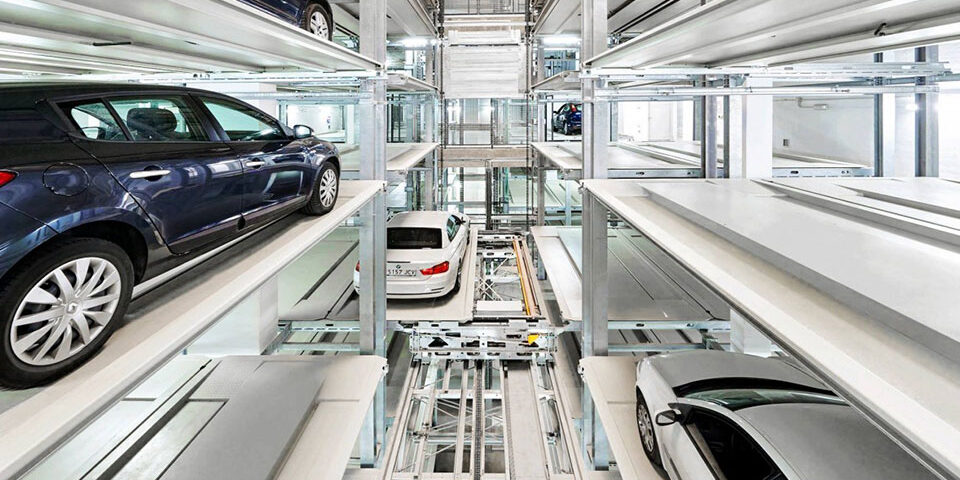
Same Cities, Different Rules: Bicycle Parking Considerations
July 21, 2020Paula’s Love Story
February 8, 2023
The answer to the question of what is the cost of automated parking is as easy as answering what is the cost of a concrete ramp garage: it varies. Parking garages respond to different variables such as size, capacity, number of levels and whether said garages are underground or above ground; however, concrete ramp garages are pretty standard in the way they are designed and built. Automated Parking Systems, on the other hand, are designed and built to suit the specific needs of specific projects. In that sense, you may say that Automated Parking Systems are a “customized” solution to fit the “specifics” of the projects in which they’ll be integrated.
Automated Parking Systems adjust to the needs and conditions of the development (such as available land, land geometry, height restrictions, etc.) and to local parking requirements and regulations. In reality, the cost of Automated Parking should be measured by the value it provides; which goes further and deeper than just comparing the two technologies (ramp vs. automated) in terms of cost per stall.
Consider this Scenario:
You need 400 parking spaces for certain development. The “go-to” answer will take you to choose a conventional concrete ramp garage. This choice translates into a big box that will take about 145,000 SqFt of your valuable land, powering over your profitable development and conflicting with the aesthetics and the architecture of your masterpiece. Why do we still believe this is acceptable?
Now, let’s look at the same 400 parking space garage in the same land. With Automated Parking Technology, the space needed to provide that same parking capacity is now reduced to about 50,000 SqFt... What will you do with your extra 95,000 SqFt?
The average cost (per space) of a parking garage:
The average cost of building a concrete ramp garage is anywhere between $25k-$50k per space, depending on whether they are above or below ground. Automated Parking Systems are more difficult to price because there are a number of different systems and technologies in the market and not all systems or technologies work the same way. However, it is safe to say that in the worst-case scenarios, the cost per stall of an Automated Parking System is either lower or comparable to their ramp garage counterparts.
In the cases where the cost per stall is less Automated Parking Systems are a no-brainer, but in the case where they are cost-comparable, Automated Systems still offer a much greater value because they take considerable less land and less time to build, and, as you know very well, in Real Estate development less land and less time equals less cost and more profit.

Let’s look at an Automated Parking Tower for example, comparable to a ramp garage in cost per stall, but able to park 70 vehicles in the footprint of three. Yes, you read right, 70 cars in the space you would need to park three cars.
Cost of Land, Building, Maintenance and Other Considerations
So far we have discussed the dollar-to-dollar cost per stall for both concrete ramp garages and Automated Parking garages and the significant space-saving capabilities offered by towers (one of the many systems available on the market); what we haven’t discussed yet are the many other economies, benefits and advantages that Automated Parking Systems offer over concrete ramp garages.
If you need 50% to a third of the land to build parking, it means you need less land. This translates into two ways to save: you pay for less land or you free a considerable amount of your existing land to build more relevant income-producing development (as opposed to building parking). Automated Parking Systems not only save developers land money but they also greatly contribute to current urban concepts that call for better land use.
A conventional parking garage needs elevators, stairs, lighting and ventilation on all levels, and enough maneuvering space for vehicles to drive around and to drive in and out space. You would think that this is just the “normal” cost of parking, right? Not for Automated Parking. Automated Systems have drivers park their cars in loading bays, then the system safely parks the cars (without drivers) on the upper storing levels and bring them back to the loading bays when drivers retrieve their cars. The parking system “is” the elevator, the only elevator you need.
Automated Parking Systems not only reduce the space, but also eliminate the cost of building ramps, elevators, stairs and drive aisle; and because the storing levels of the systems are not accessible to people, the only level that needs lighting, ventilation, security, janitorial or other like services is the one level with the loading bays. This represents significant savings in electrical, security, janitorial and other related maintenance expenses, and although regular and common maintenance of the structure is to be expected, comparable operating and maintenance costs are also reduced.
Automated Parking Systems are also faster to build than their concrete counterparts (about half the time for most systems), which means developers save in insurance, general conditions, equipment rentals, man-hours, mezzanine loan interest, and other similar ancillary costs. In addition, if the project requires excavation, developers save big on cost because they don’t have to excavate nor build ramps, stairs, elevators and drive aisles and they don’t have to light, ventilate or invest on wayfinding and signs. Automated Parking Systems are also faster to depreciate because they are not buildings.
Insurance costs is another plus to consider. Automated Parking Garages are safer for people and property because they significantly reduce the risk of constant interaction between people and vehicles and, because there is no human access to the vehicles, the risk of theft, vandalism or accidental damages (such as scratches or dents) is also significantly reduced. Also, because the loading area is much smaller and more exposed than isolated parking levels, the risk of crimes against individuals is also reduced.

To build an automated parking system or to build a parking garage?
Because of the commonality and popularity of conventional concrete ramp garages, we are all versed and knowledgeable about their cost, their pros and their cons; so let’s focus on the key benefits of Automated Parking System:
- Less land, less cost or more land for income-producing square footage (better land use)
- Comparable or lower in cost per stall
- Faster to build, faster to depreciate
- Lower construction, insurance, maintenance and operation costs
- Increased vehicle and user safety
- Opportunity to increase LEED points
The conventional parking garage was at some point a necessary evil, but the costs and space involved is a high price to pay anymore, not only in terms of economy, but in terms of conscious urban development, environment and architectural integration. Automated parking is a tried and true technology that saves developers time, space and money; savings that could be passed on to the customer.
Because they are a “customized” solution to parking needs, the cost of Automated Parking will depend on the variables and specifics of each project; however, Automated Parking Garages will always be more advantageous and cost-effective in the short and long term and will always exceed their concrete counterparts in terms of value engineering.
If you're interested in learning more about our solutions, please take a look at the following articles:
- What is the cost of Automated Parking?
- Types of Automated Parking Systems
- Three Things To Know Before Considering Automated Parking
- Is Automated Parking Sustainable?
- Case Study
- Visit our blog
We look forward to hearing from you soon!
Call us today and see how our Automated Parking Systems can help your projects!
(754) 200-8441
______________________________




